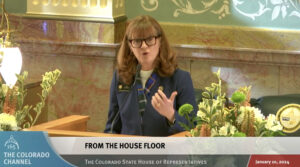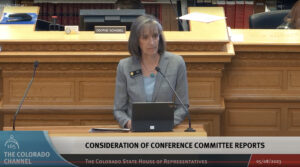Colorado Senate Democrats appear unlikely to capture a supermajority in that chamber, even as House Democrats are on track to maintain that veto-proof status in theirs, leaving the Legislature with a kind of status quo following the 2024 election.
Several key races in each chamber remain too close to call, but in most cases those races have shown little change in results as more ballots have been counted. Some of the biggest pockets of untabulated tallies now remain in El Paso County, where both a state Senate and a state House race are on the line, and in Weld County, home to a key House race.
But as of mid-afternoon Wednesday, nearly 24 hours after polls closed, Democrats appear to have retained a 23-12 margin in the Senate, leaving them one vote short of supermajority status. Republicans won back a seat that had been held by party-flipping Democratic Sen. Kevin Priola but appear likely to lose a redrawn El Paso County seat held by term-limited Senate Assistant Minority Leader Bob Gardner.
Meanwhile, while Republicans appear poised to win back one seat in the House to lower the margin there to 45-20, they are unlikely to nab the three seats they needed to crawl out of their supermajority status in which they hold less than one-third of seats. The only Democrat-held seat in which the GOP now has a lead is one that sits in the Greeley area, where Republican Ryan Gonzalez holds a razor-thin advantage over Democratic Rep. Mary Young in a rematch of a tight contest from 2022.
The difference between a majority and supermajority
Were Democrats able to capture more than two-thirds of the seats in both chambers for the first time in memory, they would have been able to override gubernatorial vetoes, push constitutional amendments onto the ballot and change floor rules without GOP support. Republicans like Senate Minority Leader Paul Lundeen of Monument noted that just this year, Polis vetoed two business-opposed bills to expand labor rights — decisions he said might not stand if Democrats grab supermajorities and try to run them again in 2025.

Colorado House Speaker Julie McCluskie offers remarks on opening day of the 2024 legislative session.
Still, Democratic leaders who as recently as 2018 were in the minority in the Senate and as recently as 2012 were in the minority in the House celebrated maintaining their significant majorities. House Speaker Julie McCluskie of Dillon and House Majority Leader Monica Duran of Wheat Ridge attributed the victories, which came in the face of a national GOP surge, to policies like environmental protections and the 2024 affordable-housing package.
“This cycle, we were defending seats in Republican territory that (President-elect Donald) Trump won four years ago, and we still won an overwhelming majority because Coloradans agree with us on the issues that matter most,” Duran said in a news release.
Key Senate races
Republicans’ biggest gain in the Senate came as child-care-center owner Scott Bright defeated Brighton City Councilman Matt Johnston by a margin of 56% to 44% to win back the seat from Priola, who is term-limited. Democrats never won that seat in an election, but Priola switched parties after the 2022 legislative session, and Johnston tried to boast his moderate bona fides in a district that always leaned red.

Scott Bright speaks at a Colorado Chamber of Commerce event.
However, Democratic state Rep. Marc Snyder of Manitou Springs appears poised to win Gardner’s heavily redistricted seat, leading Republican El Paso County Commissioner Stan VanderWerf by a margin of 50% to 47%. Counting continues in the district, but the moderate Snyder’s lead has remained largely unchanged since Tuesday.
One of the biggest wins for Republicans in the Senate is a hold, as state Rep. Marc Catlin remains ahead of Glenwood Springs small businessman Cole Buerger 52% to 48% in an open GOP-held seat that also was redrawn since the last election. Both men sought the vote of unaffiliated residents in this contest, with Catlin leaning on his leading knowledge of water rights and his status as the only Republican appointed to a committee vice chairmanship over the past three years.
Two other key races stayed with incumbents. Republican Sen. Cleave Simpson of Alamosa beat Durango farmer Vivian Smotherman 56% to 44% in set that shifted toward Democrats after redistricting, while Democratic Sen. Chris Kolker of Centennial holds a 52% to 48% lead over Centennial City Councilwoman Robin Carnes in a seat that moved toward Republicans.
Key House races
In the House, Republicans made their most serious efforts toward recapturing five seats that had been held by the GOP sometime in the past decade and one closely contested seat that has been edging toward toss-up status over that time. In the end, however, they appear likely to capture only that one toss-up seat while falling short in the other races by anywhere between 1.5 and 4.5 points.

Statehouse candidate Ryan Gonzalez speaks to a Colorado Chamber of Commerce event.
As of 10 p.m. Wednesday, Gonzalez leads Young by just 64 out of more than 17,600 votes cast in Greeley-area House District 50, though his lead has inched up ever so slightly over since Tuesday night.
In the other razor-thin race, first-term Democratic Rep. Stephanie Vigil of Colorado Springs leads former congressional candidate Rebecca Keltie by a margin of 50.7% to 49.3%, though Republicans say they are hopeful that further counting can change that outcome.
Meanwhile, in four other tightly contested House races:
- Democrat Jillaire McMillan, a late-campaign ballot addition when first-term Rep. Jennifer Parenti decided to abandon her re-election bid this summer, leads former Rep. Dan Woog in an Erie-area district 51.9% to 48.1%;
- Democratic Rep. Tammy Story of Conifer has defeated former Morrison Police Chief George Mumma 52.2% to 47.8%;
- Democratic Rep. Bob Marshall, who shocked many by winning a Highlands Ranch-area seat in 2022, is leading businessman Matt Burcham 51.7% to 48.3%; and,
- Democratic education activist Katie Stewart, seeking to hold onto the Durango-area seat of term-limited Rep. Barbara McLachlan, is leading Ignacio Mayor Clark Craig by a margin of 51.4% to 48.6%.
Will change in Democrat office-holders negate power of supermajority?

Colorado state Rep. Tammy Story criticizes changes made to her bill on pipeline safety on the House floor in 2023.
While Republicans argued that they needed to end Democrats’ House supermajority to bring some semblance of balance to the chamber, other observers have said that the primary elections already accomplished that task somewhat. In June, voters unseated progressive firebrands Elizabeth Epps and Tim Hernandez and opted in several contested races for moderate candidates like Rep.-elect Michael Carter of Aurora.
The Colorado Chamber of Commerce, which endorsed both Democrats and Republicans who it believes will bolster a more business-friendly climate at the Capitol, noted that 93% of the candidates it backed have won their races. President/CEO Loren Furman said she believes that this factor will lead to more moderate and pro-business legislation.
“In the upcoming legislative session, the Chamber will be seeking out forward-thinking, proactive proposals to improve Colorado’s standing as a top state for business,” Furman said. “Colorado’s regulatory climate has been holding us back economically, stifling our competitiveness and limiting growth. This will be our top priority in the coming year, and the support of our legislative leaders will be critical to pass bold regulatory reforms to improve our statewide business climate.”
